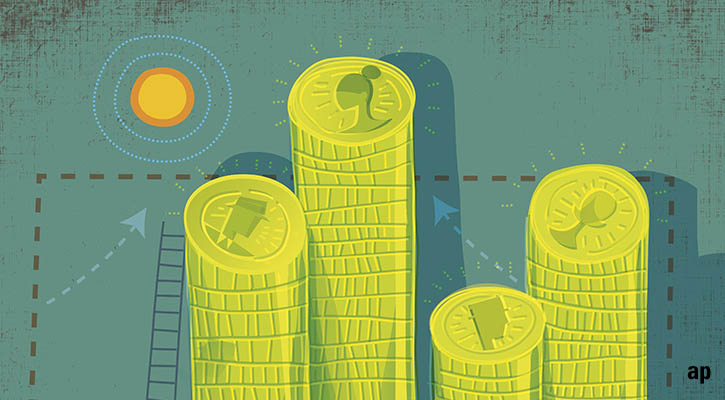European stock markets had a lacklustre second quarter, turning in a mixed performance. Perhaps the single-most important factor that affected equities worldwide during the period was the fresh dose of monetary easing (and succeeding worries over U.S. monetary tightening) adopted by central banks in the major currency regions: the U.S., Europe and Japan.
The quarter began on a mixed note, as European stock markets initially rose in April after Germany's Parliament approved an international bailout package for Cyprus and as Moody's retained Germany's top sovereign rating, citing its highly competitive economy and investor confidence.
But the markets pared those gains after the European Central Bank projected a gradual economic recovery only in the second half of the year, and subject to downside risks. The International Monetary Fund in April also lowered its projections for economic growth for the eurozone, saying it would shrink 0.3% this year compared with an earlier estimate of -0.2%. Bundesbank President Jens Weidmann cautioned that a complete recovery could take a decade. The markets fell again after Fitch cut the United Kingdom's long-term foreign and local currency issuer default ratings to AA+ from AAA in April, while maintaining its stable outlook.
For the quarter, the commodities-heavy FTSE 100 Index ended 2% lower. Commodity prices fell after a number of weak economic data points in April and May. In fact, economic indicators worldwide followed a stop-start pattern, sending mixed signals to investors and weighing on commodity prices. The commodities index dropped 7%, and crude oil prices slipped below US$100 in April, the first time they had done so over the last 12 months.
But expectations of fresh policy easing measures helped the markets recover. Global equities tracked Wall Street gains after the S&P 500 made several record highs in May, boosting investor sentiment. The ECB also helped matters, cutting its policy rate by 25 basis points to a record low of 0.5% in early May. ECB President Mario Draghi said policymakers are ready to cut rates again if required, and the sentiment was echoed by ECB executive board member Joerg Asmussen. The U.S. Fed also reassured investors and stock markets of its bond purchase program and low rates in the future.
However, stocks pared some of their gains in the second half of May after comments from U.S. Fed officials prompted fears that the bank may wind down its stimulus program. Meanwhile, the OECD cut its forecast for eurozone GDP. A slowdown in Chinese manufacturing, marking a decline for the first time in seven months, also weighed on European markets.
Overall, though, London's FTSE gained 2.4% in May. The Euronext Paris CAC 40 Index also rose 2.4%, while the FSE DAX surged 5.5%. Compared to other global indexes, only the Shanghai SE Composite managed a bigger gain in May, beating the DAX marginally as it rose 5.6%.
But all stock markets declined in June. Following a two-day meeting of the FOMC, U.S. Fed President Ben Bernanke spoke of a plan to start reducing bond purchases later this year and end the program around mid-2014 if the economy recovers as the bank expects. Stock markets fell, and the three major European indexes slumped about 3% each. Since that statement on June 19, Fed officials have reiterated they plan to continue to provide the monetary stimulus required to support the financial markets.
Toward the end of the month, S&P said it saw waning recession concerns in the eurozone countries but no meaningful recovery. However, it raised its 2013 growth forecast for the UK, but cut estimates for Germany and Italy. It also cut its inflation forecast for the eurozone.
Draghi reiterated that the ECB stood ready to act again if required but also warned that there were limits to monetary policy and that it could not create real economic growth.
Meanwhile, concerns over the Greek coalition weighed on stocks in Athens, and the index lost about 16% in June -- the worst-performing index in Europe. Greek stocks were among the most beaten down for the quarter, too, according to the MSCI All Cap Index, as the Greek index dropped 8.4% -- more than any other country index.
Among the major markets, according to MSCI, the UK declined 2.4% during the quarter. The French MSCI All Cap Index was up 1.7%, while Germany gained 0.9%.
Sector performance
Across the sectors, IT services were among the better performers along with Internet companies. Cap Gemini SA was up about 3% while Orbis AG gained 16%. Atos rose 6.5%. However, German enterprise applications major SAP declined about 9%.
Auto stocks were among the better performers among consumer discretionary names. Auto major Volkswagen AG edged marginally higher over the last quarter, while Daimler AG gained 7%. Audi AG was up 6% while Rolls Royce gained 2%. Renault SA was up 5% and Peugeot SA accelerated 11%. French auto parts manufacturer Valeo SA gained 13%.
UK banks fared badly, dragging the sector lower as they logged negative returns, with major banks such as HSBC down over 2% during the quarter. Standard Chartered PLC fell about 16%. However, BNP Paribas moved up 6% while Société Générale and Crédit Agricole gained about 5% and 8%, respectively.
Resources ended in the red, and dependent industries like machinery and industrials also took a hit as falling commodity prices combined with lower manufacturing activity to pressure stocks. Major miners such as Anglo American fell 26% during the quarter. BHP Billiton fell over 13%, and newly combined Glencore Xstrata PLC gave up almost 24%.
Coming through a tepid second quarter, investors may be encouraged by the steps taken by European policymakers in the last few days of June as they agreed to spend 6 billion euros over the next two years to support job creation and training for the youth, as well as a resolution to endorse lending to small businesses.















